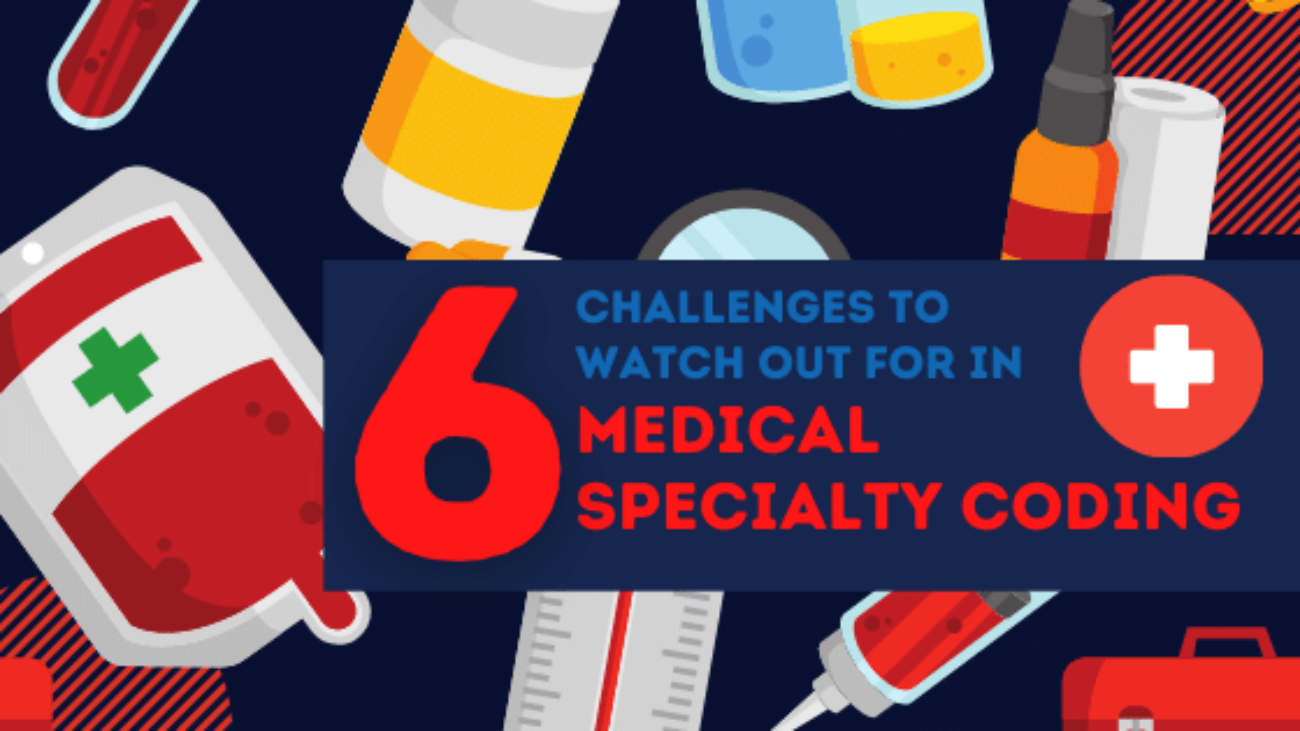Are you aware of the specialties that face most of the specialty coding challenges? Specialty coding is one of the complex processes in revenue cycle management. As ICD-10-CM implementation is involved many changes for various specialties, it didn’t deliver results and affected many areas. Healthcare professionals can experience constant revenue flow only with proper documentation of diagnosis and higher level of specificity in order to cooperate with new codes.
Healthcare professionals from various specialties try to outsource specialty coding services especially in radiology, nephrology, pediatrics, cardiology, orthopedic and ophthalmology to confront payment challenges due to ICD-10-CM changes.
The medical billing policies and regulations may comfort insurance companies but huge volume of codes remain hectic for healthcare professionals and specialty coders. Certain changes and updates in specialty coding make it more critical for revenue payments.
However specialties have unique payment challenges to deal with. Let’s see the biggest specialty coding challenges by six major specialties.
1.Radiology Specialty Coding:
- While using ICD-10, radiologists should ultimately provide the details on medical history and indications for precertification, dictation as well as medical billing process.
- Information like laterality and anatomical location should also be included while coding radiology specialty.
- The ability to bill appropriately for the radiology services depends on accurate documentation by the specialty professionals.
- Complete information and timely review on denials regarding medical necessities and Local Coverage Determinations are comparatively critical for radiology specialty to ensure constant revenue flow.
- There were changes made to fine needle aspiration codes, new codes for magnetic resonance elastography by deleting older codes for breast MRI along with computer aided detection.
2.Nephrology Specialty Coding:
- Earlier in ICD-9, chronic kidney disorder had only one code. Whereas ICD-10 contains five different codes for the same medical condition.
- Hypertensive chronic kidney disease has two codes where the first indicates hypertension and chronic kidney disease, the latter specifies the level of chronic kidney disease.
- Nephrology specialty coding will have frequent changes and it’s evident that chronic kidney disease alone has gone from single to five different codes.
- ICD-10 is being updated continuously with CPT, ICD-10 and E/M coding.
- From new specialty coding of diabetes to documentation of chronic kidney disease, it is really tough to stay on track by balancing better patient care.
3.Pediatrics Specialty Coding:
- Pediatrics specialty codes have tremendously increased over the past years.
- They often deal with high volume patients which keeps the pediatrics specialty practice profitable and also hectic. This is Especially due to billing and specialty coding errors.
- Accompanied by the huge changes in coding, it was introduced to 25 brand new codes for new born complications and practices to study.
- Along with the new 25 new codes, there were revised Z codes also adding to more coding options available to describe pediatric behavioral disorder screenings, mental health as well as delays in development.
- The high volume of codes and regular changes makes it more difficult and challenging to prevent coding challenges like specialty coding errors which halts reimbursements for practice.
- Finding better coders also seems to be difficult for this particular specialty. So, many healthcare professionals have chosen to outsource specialty coding to medical billing companies with experts and professionals who literally understand the complications involved in specialty coding.
4.Cardiology Specialty Coding:
- ICD-10 involves many new cardiology specific procedural codes.
- It’s common to miscode or misplace the code for cardiology specialty.
- AMI of anterolateral wall has changed to 121.09 in ICD-10 specialty coding with plenty of additions.
- Though there were plenty of updates and additions for cardiology specialty coding last year, there were no many revisions to worry about.
- The additional coding was added to cerebral infarction with a new subcategory that’s added for hereditary cerebrovascular disease.
- Specific coding challenges occur with errors in documentation and coding issues in common cardiac procedures which can be again tricky.
- Gaps in documentation might lead to the inability of coding certain procedures and components which also can create huge loss for business.
- Cardiology specialty coding is also complex and very essential to code comorbidities in a way to show the complexities.
5. Orthopedic Specialty Coding:
- When massive expansion takes place in musculoskeletal and injury codes, then new codes for specialty emerge.
- With ICD-10 coding, Orthopedics requires to note laterality and greater specificity to include the place of occurrence codes for injuries.
- Just diagnosing patients with spinal stenosis isn’t enough and healthcare professionals must ensure to document particular spinal region to code accurately.
- Orthopedics runs at faster speed on all the latest updates and thus remains as the toughest for orthopedics coding.
- With changes involved in documentation requirements, it’s also necessary to invest in provider training for better improvement.
6.Ophthalmology Specialty coding:
- Ophthalmology specialty coding involves two different coding sets unlike other specialties which is a huge confusion for healthcare professionals to code accurate.
- ICD-10 has resulted in new terms and specificity for laterality of eye conditions. If the conditions are listed and specified as right eye, left eye, bilateral, and unspecified , the conditions of eyelids are classified based on the areas affected whether it affects right upper, left lower or left upper and right lower eyelid.
- The volume of codes was increased for glaucoma and if differences change accurate coding for indicating laterality and stage must be used.
Importance of Specialty Coding:
- Healthcare information is under laws and stays confidential. Dealing with data isn’t easy. It has to obey many rules and policies and should follow national standards to protect health of the patient.
- As the laws remain very strict, medical billing and specialty billing experts should beware of legal issues bothering their work. The information of patient must be totally confidential and ensure if that satisfies their work with no doubt.
- The development of technologies in recent years have increased specialty coding over the years.
- Due to the sensitive data, concentration as well as focus and a good level of expertise are important to reduce errors and increase billing proficiency.
- Technology can also reduce errors in specialty coding. Machine learning and AI reduces the risk for common errors.
- Though many processes are easy to tackle, technology alone can’t replace the work of specialty coding and billing experts.
- Billing experts must have better idea on billing codes as they don’t stay the same forever.
Outsourcing Specialty Billing and Coding
- Several healthcare organizations are opting for outsourcing their end-to-end revenue cycle management to leading RCM companies to improve their cash flow with optimized investment. It is more important when it comes to specialty coding and billing since not all in-house teams are equipped enough to handle the various complexities in different departments.
- Outsourcing gives the healthcare organizations the advantage of experience. Most reputed RCM companies cater to clients of different scales. They gather experience of handling all kinds of facilities, from an independent healthcare clinic to a multispecialty hospital.
- Some RCM companies also specialize in few departments like surgery, orthopaedics, oncology, nephrology and several others. Shortlist the top companies with which your goals will align.
- Specialty coding keeps evolving every year with hundreds of added codes, edited codes and deleted codes. Professionals from RCM companies update themselves at regular intervals to stay on top of the curve.
- Outsourcing is especially a great option if you are struggling with a short-staffed team in a specialty department or clinic. Improve your organizational efficiency with the best professionals in the industry to take care of your specialty RCM needs.
Hope you got the information on Specialty coding. For more suggestions, please comment below, we will definitely consider them if relevant. For more queries and updates on healthcare, please subscribe to our blog.




